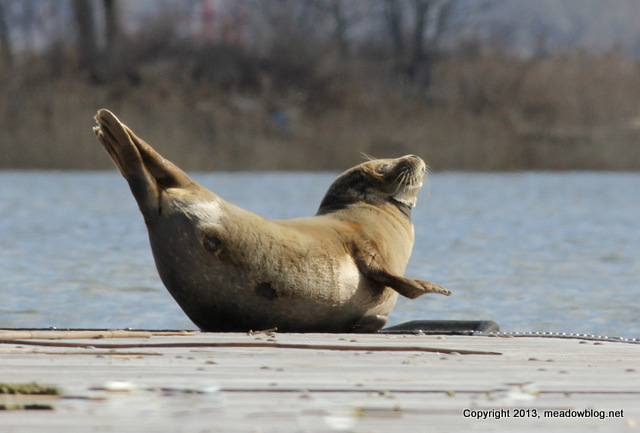
We were able to take more photos of the Harbor Seal in Carlstadt last week, and thought we would share a large selection here — along with Part II of an interview with Robert Schoelkopf, founding director of the Marine Mammal Stranding Center in Brigantine.
 What can you tell us about the Harbor Seal we had in Carlstadt?
What can you tell us about the Harbor Seal we had in Carlstadt?
It was a second-year male.
How could you tell it was a male?
It wasn’t wearing a bikini top on, and the penile opening was visible in the shot you sent.
How could you tell its age?
We could get an idea of its size by comparing it to the planks on the dock it was lying on. It was probably a 50-pounder, 60 pounder. The first-year ones, when we get ‘em in here, are usually about 35 pounds, 40 pounds. This one had some fur missing around the neck but other than that, it looked quite healthy.
Where do Harbor Seals live most of the year?
North of Massachusetts. We’ve done some satellite tagging, and we’ve had them go all the way up into Maine and Canada. They’re interesting animals because we relased oneyear here and it went all the way down to Chincoteague and spent the winter there, and then made a bee line for Maine.
The rest of the interview — and several more never-seen-before photos — follow.
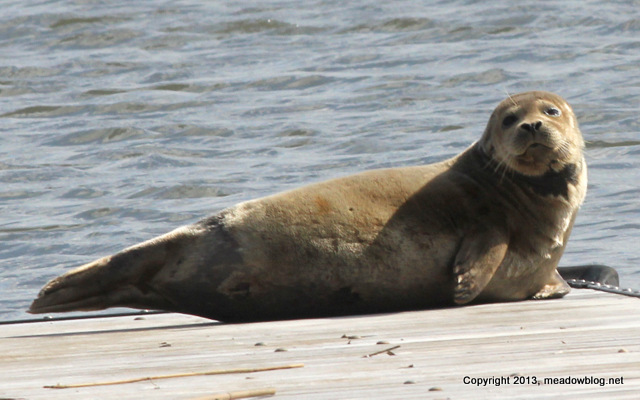 Where’s their breeding area?
Where’s their breeding area?
Usually up north, but we’ve had newborns here in New Jersey now. We had one in Monmouth Beach and one down here in the Brigintine area. they are starting to move south and give birth.
What time of year would that be?
Usually in May and June.
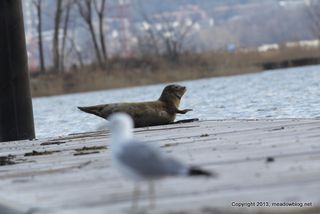 Do they usually travel in groups? We only had one here.
Do they usually travel in groups? We only had one here.
They don’t usually travel in groups. They’re not very friendly animals.
If they congregate in areas, it’s not because they like each other. It’s because it’s where the food is. a lot of these animals realize that if they hang with other seals, then there’s less food for them. So they have a tendency to look for areas that don’t have other animals. that way they have a better chance of surviving the winter on a less amount of food that’s there.
As the water warms up, usually in May 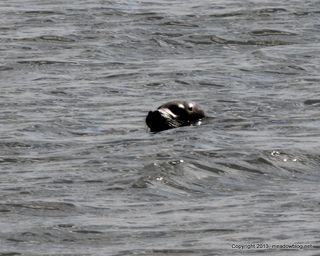 or so, and the mackerel start running up he coast, and the herring, then they travel north with them.
or so, and the mackerel start running up he coast, and the herring, then they travel north with them.
How long can Harbor Seals stay underwater?
We’ve had them stay underwater fior 15 minutes or so if they are resting. Swimming, they can’t stay under as long because they have to come up and breathe air.
After they’re done feeding — and they obviously get all their food in the water — live fish — that takes a lot of energy to chase a fish down and eat it, they then come up and “haul out,” as it’s called, to rest, to warm up and dry out and replenish the oxygen supply in their system.
 What’s their life expectancy?
What’s their life expectancy?
About 40 years … if they don’t run into a Great White.
That’s their biggest predator?
No, their biggest predator is human interaction, commercial
fishing…they get caught in nets, fish hooks in them, tangled in line…
How do the animals fare that are brought to the MMSC?
We have about an 90 percent recovery rate, for release back into the wild.
What can you tell us about the other three species of seals we might see here?
In New Jersey we have gray seals — at Brigantine we have a gray seal pup that’s only two months and we have a 335-pound, 40-year-old male, so you’re really be able to see the differences in sizes. It’s kind of impressive.
What are the other two species?
We have the Hooded Seals and Harps. The Harp Seals are interesting. we have two in house now. they are an Arctic species. They have about a 1,500-mile swim to get down to us. They’re the ones that are commercially hunted by the sealers in Canada for their pelts.
They’re not a very smart seals. Of all the seals we have, they are the least cunning because they’ve never seen people before 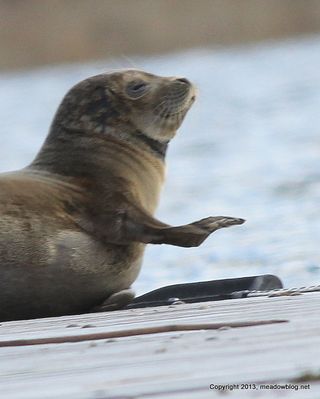 so they have no fear. They just look at you. They’re not as aggessive as the other species.
so they have no fear. They just look at you. They’re not as aggessive as the other species.
Harbor Seals are the most populated in N.J. waters.
Was the Harbor Seal we saw so calm because it was young and unafraid?
No. Harbor Seals do care. They are worried because thay are coastal animals by nature and they are aware of people. That’s why they look for areas like floating docks.
If you tried to approach him he’d just jump in the water and swim away. And that’s good, because there are people out there who still try to hunt them or take pot shots at them.
We have people in Massachusetts now, including recreational fishermsan, who don’t like them because they take away from their striper fishing.
They hired a lawyer from New Jersey to represent them to try to get rid of seals in Massachusetts waters, and they’re going to the degree of literally shooting them at night with high-powered rifles. 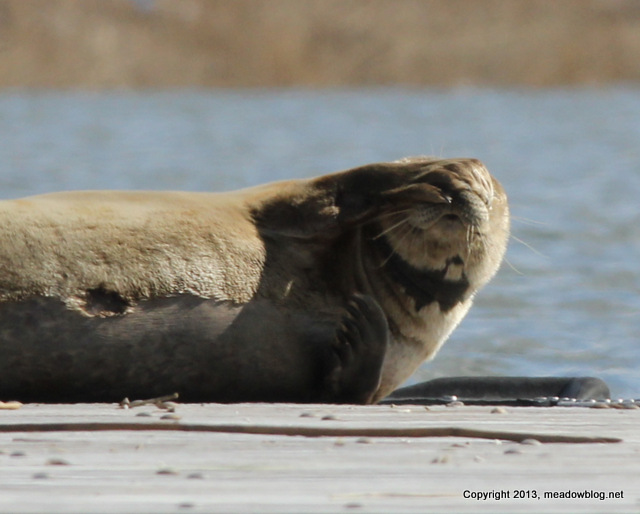

That seal is the single most adorable thing I have ever seen.